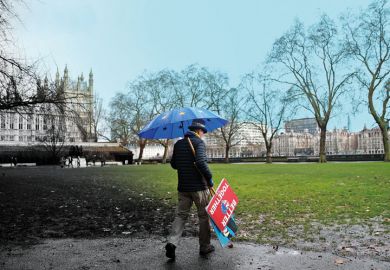Turf wars, rumours, dented egos and rising stars. What’s not to like about government reshuffles? This month’s reshuffle brought more fireworks than expected despite Boris Johnson’s decision not to fundamentally reshape Whitehall. But beyond the headlines there have also been a number of more subtle changes, the implications of which aren’t yet fully clear.
For universities there is a big, perhaps potentially momentous change. For the first time in a decade, ministerial responsibilities for science, research and innovation have been separated from the universities brief. Research and innovation, an important driver of productivity, growth and the "levelling up" of regions, now sits under a more junior minister, Amanda Solloway, in the business-facing department while universities are in the scope of Michelle Donelan, within the Department for Education. It is a move described on Wednesday by the last minister for universities, science, research and innovation Chris Skidmore, as “a strong sign of the vital importance of both these briefs being given the full attention they deserve”.
For the past 10 years, having one role looking holistically across the entire higher education system has been helpful. It has enabled universities to link their roles as engines of learning, skills, innovation and productivity, alongside serving local communities and contributing to national priorities.
Arguably, this division of ministerial responsibilities matters all the more following the 2017 Higher Education and Research Act, which split the responsibilities of the overarching Higher Education Funding Council between a new regulator, the Office for Students, and a new research agency, UK Research and Innovation. This latest separation seems to set the seal on a different way of looking at universities. Not as integrated institutions, but organisations delivering different outcomes for students on the one hand and research funders on the other.
The challenge for our new ministerial power couple is to ensure that a holistic lens on the different functions of universities is retained, and to appreciate that universities can be powerful allies in delivering on aspects of the government’s wider agenda for economic and social change.
With our co-author Lord Kerslake, in a report published today by the Higher Education Policy Institute we have suggested some key recommendations to address this. Making Universities Matter: how higher education can help to heal a divided Britain outlines how the multiple and interrelated missions of universities can be renewed and accelerated, in partnership with the new government and others.
This is an important message to send at a time when universities are increasingly the target of criticism for being out of touch, offering poor value for money, and are in the midst of a difficult period of industrial action prompted by concerns over pay, pensions and workload. These debates are important, but we must ensure that they don’t undermine universities’ wider contribution, and permanently damage public and political perceptions of the role and potential of higher education. It would be ironic if the UK fell out of love with universities just as most countries are investing heavily in higher education.
Brexit focuses a good deal of this anxiety. Almost unanimously, universities wanted to remain – an argument now comprehensively lost. Brexit involves not just withdrawal from the European Union, but a potentially fundamental reshaping of the nation’s economic and social model. Universities must make themselves integral to that conversation, reaching out and engaging with communities in parts of the country that have for too long felt left behind by the lack of educational and economic opportunity. Our paper articulates a proactive and positive role for universities in delivering educational opportunities, and as anchor economic and social institutions in “left-behind” towns and regions – putting social renewal at the heart of their mission.
At the same time, government should recognise and embrace universities’ contribution on skills and widening participation for students from disadvantaged backgrounds. It also needs to fundamentally reconsider the way research is funded and focused, if we are to address the UK’s debilitating productivity divide.
There should be a rebalancing of research funding towards more targeted regional investments to help address economic imbalances; an idea echoed in the recent Nesta report on driving innovation across the UK.
If a divided Britain is to be reunited, and the economy reshaped so that everyone has opportunity to reach their potential, universities, with government, need to step up to the plate. Without higher education, it is near impossible for government to realise its ambitions for a knowledge economy; to deliver on its skills agenda; to ensure that the NHS and police can recruit and train the numbers that have been promised; and to truly “level up” regions.
There is much to be done, certainly enough to keep two ministers busy, and they will need to work effectively together. Universities too need to embrace a civic mission once more.
Sir Chris Husbands is vice-chancellor and Natalie Day is head of strategy and policy insight at Sheffield Hallam University.
Register to continue
Why register?
- Registration is free and only takes a moment
- Once registered, you can read 3 articles a month
- Sign up for our newsletter
Subscribe
Or subscribe for unlimited access to:
- Unlimited access to news, views, insights & reviews
- Digital editions
- Digital access to THE’s university and college rankings analysis
Already registered or a current subscriber?




